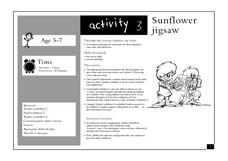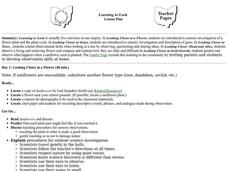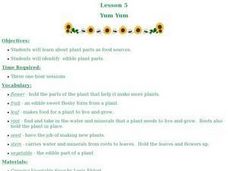Curated OER
How to Grow a Sunflower Plant
Learners explore botany by conducting a sunflower growth experiment. In this plant life lesson, students identify the anatomy of a sunflower plant and the essential nutrients it requires to grow. Learners utilize compost, soil, garden...
Education Outside
Life Cycle of a Sunflower
From a tiny seed needing water and warmth to the bud that will blossom into a flower, elementary pupils illustrate the stages of the sunflower life cycle through dance and drawing.
Garden Earth Naturalist Club
Parts of a Flower! Flower Dissection
Sometimes the best way to learn about plants is to see the different parts of a plant yourself. Groups of learners dissect flowers to answer questions about what they observe and what they wonder about their flower.
Curated OER
Parts of the Plants that we Eat
First graders study plants and their parts to see what parts are edible. In this plant lesson students are assigned plant parts and they are to put them in the right category.
Curated OER
Sunflower Sundance
First graders study sunflower plants and identify its parts. They plant sunflower seeds and watch them grow and make sunflowers out of paper plates and colored paper. They watch videos and visit websites about sunflowers.
Curated OER
Sunflower Jigsaw
Students recognize and name the main parts of a flower. In this life science lesson, the teacher leads a discussion about the parts of a plant, then students color and cut out the parts of a planet, then glue the parts together...
Curated OER
Plant Reproduction Chapter #4
The only way to employ a plant reproduction presentation void of pictures is to support it with actual sample flowers. Botany beginners learn about plant reproduction through an underdeveloped outline of flower structures, reproductive...
Curated OER
Sorting Things Out
Written to examine seeds that grow in Kansas, you can adapt this lesson to anywhere you live. Learners sort a mixture of five different seeds to by any characteristic of their choice. When your budding scientists are exploring the life...
Curated OER
Designing a Germination Experiment - Part 1
Students experiment with seeds and germination. In this natural science lesson, students discuss the stages of germination. Students engage in a 4 part hands on science activity to view the process of germination.
Curated OER
Bee Pollen Popular
The world would be a much different place without the help of pollinators. Read about the important role bats, hummingbirds, and various insects play in plant reproduction, exploring the interdependence of living things in an ecosystem....
Curated OER
Pollination Power
Second graders study and examine the structure of a flower. For this pollination lesson, 2nd graders observe pollinators in the garden and dissect a flower. Students then plant strawberry plants in the garden and observe the...
Curated OER
Planting Seeds Around the World
First graders discuss the book The Lorax and research what living things need. In this environmental lesson, 1st graders investigate how humans affect the growth of plants. Students conduct an experiment with sunflowers.
Curated OER
Seed Structure and Seed Dispersal
Third graders plant seeds. In this seed structure lesson, 3rd graders identify parts of a seed and plant a lima bean seed. Students discuss and reflect on the process in their journals.
Curated OER
The Organization and Function of Plants
In this plant worksheet, students investigate the structures and functions of plants. They also study seed germination through the use of a wall chart.
Curated OER
Light Plants and Dark Plants, Wet Plants and Dry Ones
Students plant sunflower seeds in plastic cups, and once germinated, these are exposed to different conditions of light levels and/or soil moisture contents. Students measure growth of the seedlings every few days using non-standard...
Curated OER
Salt is Good On Sunflower Seeds, But What About Cypress?
Students record their observations about growing a cypress plant and putting salt in the plant. For this cypress plant lesson plan, students observe and record what is happening as the cypress plant grows. This gives directions for...
Curated OER
Bean There, Done Plant
Students explain that events in nature follow an orderly progression when they plant seeds and observe the development of the seeds. They count seeds and find the likenesses and the differences of many seeds.
Curated OER
Learning To Look
Sixth graders investigate a flower plant and the plant cycle. They extend observational skills when looking at a tree by observing, questioning and sharing ideas. They observe a living and nonliving flower and compare and contrast how...
Curated OER
Designing a Germination Experiment
Learners explore botany by participating in a seed experiment. In this plant nutrition lesson, students define several science experiment vocabulary terms like observation, treatment, and replicate. Learners utilize soaked seeds in a...
Curated OER
From One Seed Grow Many Seeds
First graders practice identifying plants by singing a song. In this plant life lesson, 1st graders sing the song "Parts of a Plant" which is based on the anatomy of sunflowers. Students discover agriculture techniques while...
Curated OER
Yum Yum: Making Vegetable Soup
Learners investigate agriculture by reading a book. For this plant life lesson, students read the book Growing Vegetable Soup by Louis Ehlert, and examine the ingredients used in the book's soup. Learners create an...
Curated OER
The Magic School Bus Goes to Seed
Students learn along with Ms. Frizzle's class. In this Magic School Bus lesson plan, students get a bugs-eye view of the flower world and find out how seeds are created, how they travel, and how they grow into plants.
Curated OER
Seed Detectives
Students examine seed coats. In this biology lesson, students look at pictures of magnified seed coats, then use hand-help magnifiers or microscopes to look at seed coats on their own.
Curated OER
Seed Sensation
Students explore seeds through dissecting, sorting, comparing and contrasting. They draw their observations of both a closed and open seed and then they label the parts of a seed. They brainstorm where seeds come from. They compare seeds...

























